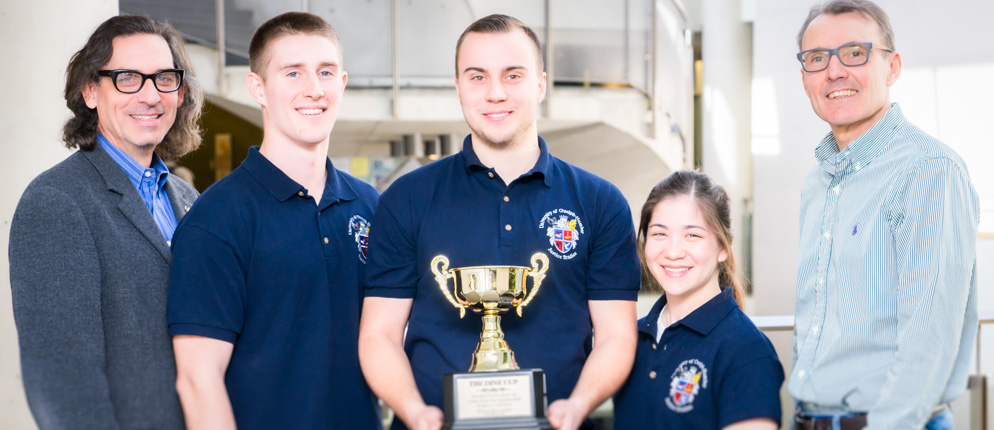- Future Students
- Current Students
- Faculty
- Staff
- Alumni
- Others
Students crack case to win CSI competition

Racing against the clock, a team of University of Guelph-Humber students recently took the top prize at a crime scene investigation competition at Mount St. Mary’s University in Maryland. In just 50 minutes, the students had to crack a case by investigating a crime scene, collecting evidence and interviewing witnesses.
Each year, Mt. St. Mary’s hosts the Robert B Fram CSI Challenge, which welcomes students from across the US and Canada to compete in timed challenges to investigate a crime scene. Since 2008, a team from UofGH has traveled down to take part, and while UofGH students typically do well in the competition, this year they proved especially effective. In addition to first place, UofGH teams also took third, fourth and fifth place among a slate of 25 other teams.
“This competition is a chance for the students to put into practice everything they’ve learned,” says John Irwin, who coaches and trains the students along with Glen Barenthin. “We tend to teach this subject from a conceptual level. If you’re an investigator and get to a crime scene, how do you react to what you see? We talk about all the forensic considerations you need to make.”
Along with training from the professors, some of last year’s student competitors also help to teach the new students at UofGH what they know.
In each competition, the team of three divides up the roles of investigator, photographer and interviewer. The first two survey the crime scene, recording the position of its furniture and items, collecting and analyzing evidence, while the latter role mostly works outside of the scene. They maintain the integrity of the crime scene by keeping nosy neighbours and the media at bay while also soliciting information from the people present.
“They treat the crime scene like it’s a real situation, so the competition is really thrilling,” says Genevieve Jung, 3rd-year Justice Studies student, and a member of the winning team. “You have judges with you in the room the whole time, and they’re asking you questions, wondering why you’re doing what you're doing and to explain your thinking for each step. These judges are specialists in forensics and policing, so it’s a valuable experience, even if it’s stressful.”
Among her other winning teammates Emil Olejarski and Ryan Gardiner, Genevieve was tasked with taking photos of the crime scene, starting with a shot of the door, and then shots from each corner of room. She also came equipped with a measuring tape, and so recorded the distance of objects in relation to one another. While Genevieve says a close attention to detail is important for the work, it was her team’s constant communication that led to their win.
“Your investigator will let you know which piece of evidence to photograph and measure first, then he’ll collect it before you move on. It’s the communication that’s key. He dictates the steps and then I follow them and give feedback on what I’ve found,” she says. “He’s also speaking with our interviewer, trying to draw in what he’s heard from witnesses.”
After their 50 minutes were up, the group filed their reports and waited for the results. The judges gave the teams feedback and critiques on their work before announcing the winners.
“When they said our team came first, I jumped up and started yelling,” Genevieve says with a laugh. With her team taking the top prize, Genevieve is excited to be competing again next year.
“The opportunity was really valuable, and we were able to use all the knowledge we’ve gained in Justice Studies to compete for the school, but I’m excited for the next step,” she says. “I want to help train new students and make sure they do great next year too.”
Learn more about Justice Studies at UofGH.

